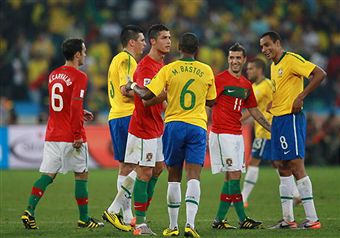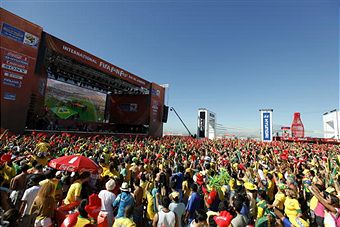By David Owen in Durban
June 25 – If you can’t get a ticket to the match, there are worse ways to watch it than with the sand trickling between your toes on a palm tree-fringed beach lapped by the Indian Ocean.
This was my fate today as Portugal took on Brazil in Durban’s spectacular new stadium in arguably the most keenly anticipated clash of the 2010 World Cup’s group phase.
As the game got under way, I was standing a couple of miles away with thousands of yellow- and red-shirted fans, studying the action on a giant screen in a FIFA fan zone.
There was a carnival atmosphere as fans munched portions of chips and sipped beer from plastic containers, serenading Cristiano Ronaldo with screeching vuvuzelas whenever the Portuguese talisman and captain threatened to get into his stride.
If Germany 2006 was the World Cup in which fan zones became a big part of the story – thanks notably to the Berlin Fan Mile which was visited by millions – South Africa 2010 has seen them become an indispensable part of the tournament’s furniture.
It is hard to conceive of a more idyllic one than Durban’s, on one of the city’s chain of beaches, though no doubt Brazil will have ideas for similarly stunning settings for 2014, when it hosts the World Cup for the second time.
The only, to me, unwelcome distraction was a giant Coca-Cola bottle to the left of the screen.
But since the soft drinks giant was presumably helping to fund the facility, we can forgive them this intrusion.
One point FIFA might want to consider as it refines what is clearly a knockout idea, is that kids struggled to see, no matter how much they craned their necks, through the sea of adult bodies all around them.
As for the match, well joga bonito it was not, with seven yellow cards dished out in the first half alone, though a goalless draw sent both teams to the knockout stages.
 Brazil in particular manifested a tough physical streak, which suggests they will not be pushed around as the tournament starts to draw towards its conclusion.
Brazil in particular manifested a tough physical streak, which suggests they will not be pushed around as the tournament starts to draw towards its conclusion.
They still sport the trademark yellow shirts, but today’s Brazilian team are supremely fit and disciplined professional athletes.
In this respect, they bear no comparison with the side that kick-started Brazil’s dominance of the world’s favourite sport in Sweden in 1958.
Then, as sportswriter Jonathan Wilson notes in his excellent book, Inverting the Pyramid, the 33 players in Brazil’s provisional squad had a total of 470 teeth extracted as part of their preparations.
In Durban 52 years later, the match petered out disappointingly as both teams, apparently decided to save their strength for the knock-out stages.
But as a full moon came up over the ocean, it really didn’t seem to matter.
Contact the writer of this story at zib.l1745329260labto1745329260ofdlr1745329260owedi1745329260sni@n1745329260ewo.d1745329260ivad1745329260
Related stories
June 2010: Ronaldo and Portugal fire World Cup warning

